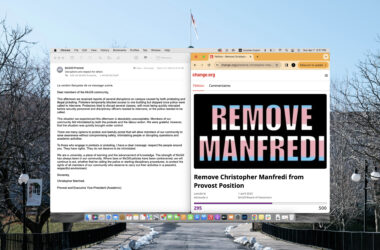After working to send McGill student teachers to Indonesia for over a year, professor Fiona Benson was “gobsmacked” to learn that the university’s new travel directive would force the trip’s cancellation less than a month before departure.
“I was given a green light to go to Indonesia by [Faculty of Education Dean Hélène Perrault] and by the administration,” said Benson, who is also the director of the Faculty of Education’s Office of Student Teaching. “This was a project that took months to build with very good minds behind it, and it was pulled very late.”
McGill’s new travel directive prohibits student participation “in any university related activities, be they curricular or co-curricular, in countries with a level-three (avoid non-essential travel) or level-four (avoid all travel) warning.” Indonesia has a level-three travel warning, as issued by Canada’s Department of Foreign Affairs and International Trade. In addition, some regions of the country currently have level-four warnings.
Eight undergraduate students were scheduled to leave for Indonesia in the third week of October. They planned to spend nine weeks as teachers in the Program for International Attachment, Global Education, and Training (PIAGET) network of schools. All expenses were going to be paid by their Indonesian hosts. The trip was cancelled shortly before the new travel restrictions were released in a memo on September 25.
Deputy Provost (Student Life and Learning) Morton Mendelson identified the trip to Indonesia as the catalyst behind the new travel directive.
“It came to our attention that there were people who were not taking what might be considered appropriate precautions with respect to student travel, and we felt that we had to take control of the situation,” Mendelson said in an interview with the Tribune two weeks ago.
When asked earlier this week to name specific precautions that had been neglected by the planners of the trip to Indonesia, Mendelson declined to engage in “a public conversation” with Benson.
“The trip to Indonesia was cancelled because there was, and remains, a level-3 DFAIT travel warning to the country, plain and simple,” said Mendelson. “DFAIT travel warnings are not new, and McGill has heeded them in the past.”
Mendelson cited the Africa Field Study Semester reshuffling earlier this year, and the suspension of a bilateral exchange agreement with Technion-the Israel Institute of Technology-as examples of McGill heeding DFAIT warnings in the past.
According to Quebec civil law, liability waivers can be rendered invalid in the case of injury or death. Therefore, even students who sign liability waivers could theoretically sue the university if injured while on McGill-sanctioned trips abroad.
Benson maintains that proper precautions to provide for student safety were taken, and that, as adults, the students should have been allowed to determine if the risk was acceptable.
“There was nothing haphazard about this trip,” Benson said. “I went to Indonesia and visited all the schools our students would be working at, and I helped to train the [Indonesian] cooperating teachers who would work with our student teachers. I liked what I saw, and I never felt at risk.”
Kim Grenier, a U3 secondary education student scheduled to go on the trip, said that the trip fell through despite Benson’s hard work.
“Going to Indonesia in the first place was giving us an incredible opportunity to be immersed in another culture and see what their teaching techniques were,” Grenier said. “And it was an international school, so it was providing us with networking opportunities and numerous opportunities to see what the profession is like. Not being able to go … is a huge setback.”
Grenier is currently fulfilling her field work requirement working with special needs children near her home on Montreal’s South Shore. She lamented the short notice of that students were given.
“We didn’t have much time to turn around and try to find another experience that would have been like [studying in Indonesia],” Grenier said.
Benson claimed that some students had given up jobs and leases that are no longer available to them in order to go to Indonesia.
Students’ Society Vice-President University Affairs Nadya Wilkinson said that SSMU, in conjunction with the Arts Undergraduate Society and Post-Graduate Students’ Society, is gathering information to combat the new travel directive. The administration’s revised guidelines are expected to be released by the end of October.
“As soon as the policy and the guidelines come out, then we can get loud with this,” Wilkinson said.
Both Benson and Grenier stressed that while Indonesia is not completely safe, students are exposed to some danger anywhere they study.
“I was asked if I could guarantee the safety of my students, and I said no. But I can’t guarantee their safety in Montreal [either],” said Benson. “I’m not against McGill tightening procedures, but this blanket ban and the last-minute cancellation of this project without really doing due diligence, is not a decision I’m happy with.”








